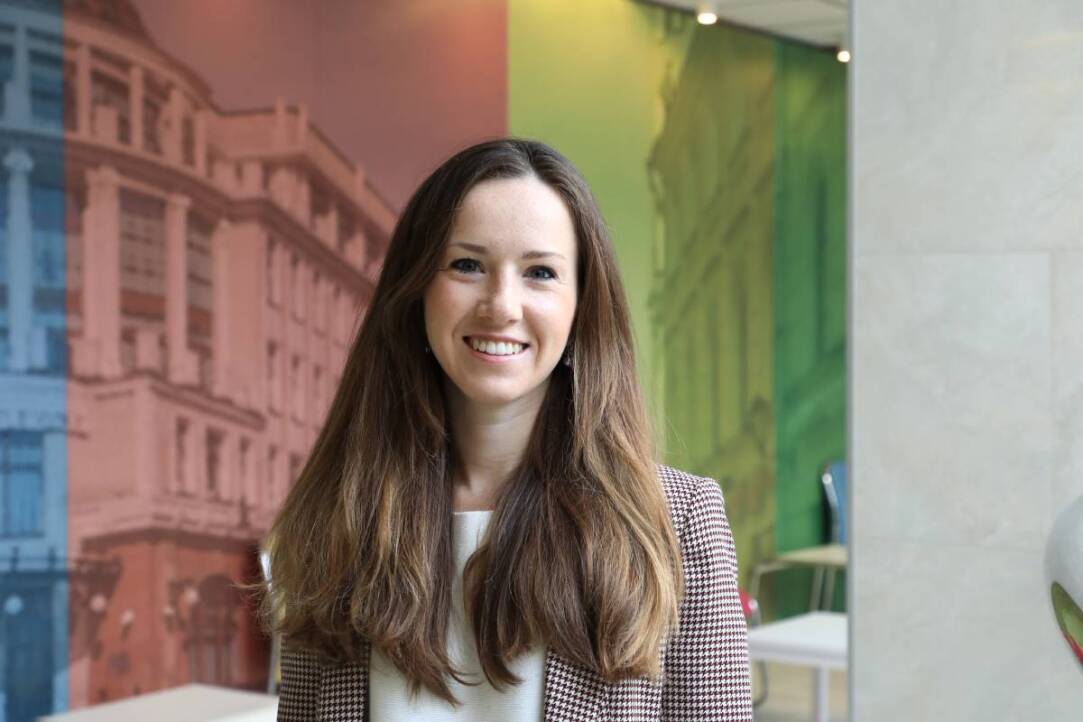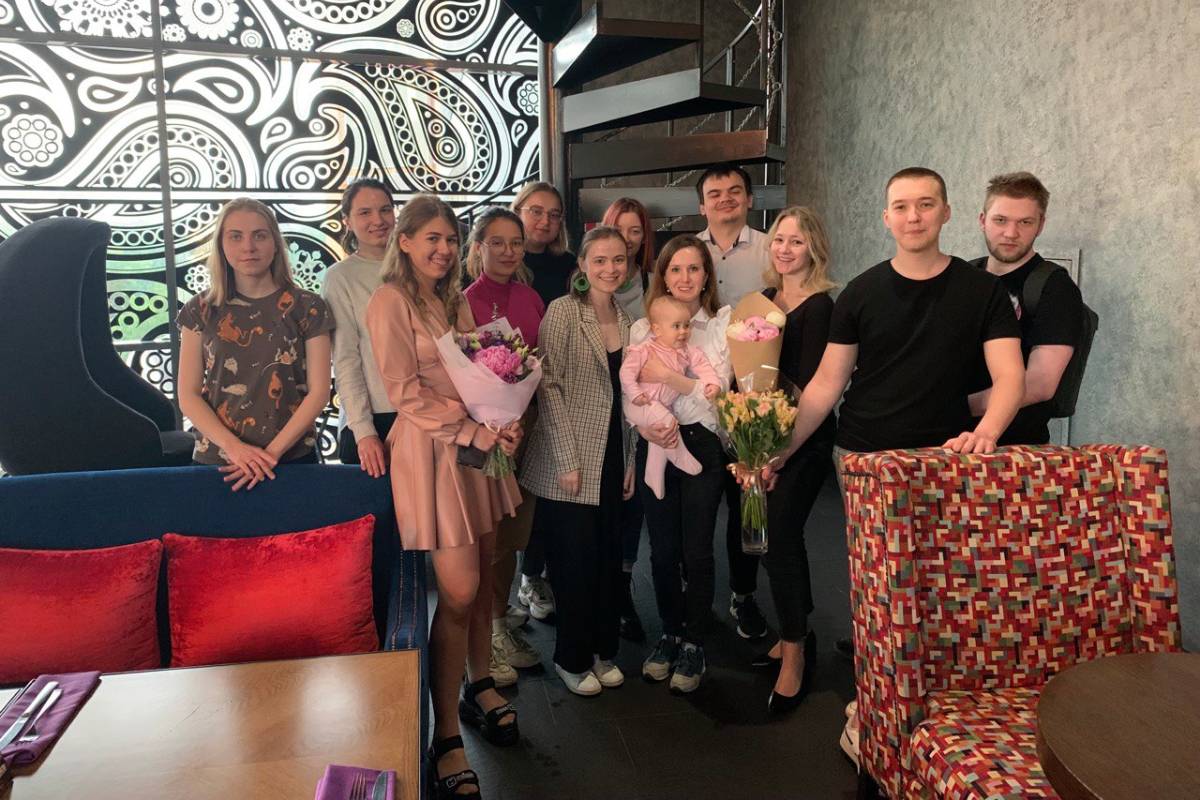‘Mathematics Is Practically Everywhere: in Physics, Programming, Economics, Sociology, Biology, and Medicine’

Applied Mathematics is one of the flagship educational programmes run by the HSE Tikhonov Moscow Institute of Electronics and Mathematics. Anna Presnova, a lecturer at HSE University since 2018, has recently become its Academic Supervisor. She talked about the changes awaiting the programme, her personal research interests, and what it means to be a mother of two children while being involved in research, teaching and administration at the same time.
— Dr Presnova, you received your undergraduate degree in physics, but continued your academic studies in mathematics. What was the reason behind this turnaround?
— Indeed, I studied at the Faculty of Physics of Moscow State University, but in my third year, when choosing a department (a track in HSE University terms), I went to the new Department of Physico-Mathematical Methods of Control. It was opened by Stanislav Vassilyev, Director of the V. A. Trapeznikov Institute of Control Sciences of the Russian Academy of Sciences. Because of that, all of the lecturers at the Department were not from the Faculty of Physics, but from the Institute. The Faculty of Physics has dozens of departments, each dealing with a different area of physics. But I wanted something versatile, with more mathematics and computers, so I chose this one. There were not a lot of computer-related activities, but I changed field: thanks to the department, I met Valery Afanasiev (Tenured Professor at HSE University—ed.). Under his guidance, I wrote my fourth-year term paper and my graduation thesis. And then, under his guidance, I continued my postgraduate studies. I chose my doctoral programme not at Moscow State University, but at the HSE Tikhonov Moscow Institute of Electronics and Mathematics, which was part of HSE University by then. So the turnaround was not abrupt, but it turned out that this was in many ways the decisive choice in my life. Prof. Afanasiev became someone with whom, in addition to writing my dissertation work, I could also share my day-to-day joys and sorrows.
— What is your area of expertise?
— Automatic control theory. Here at HSE MIEM, only Prof. Afanasiev teaches this subject. There are not many specialists in this field, especially in the modern side of it. Of course, it has to do with industry. About 50 years ago, our country needed it when building automated systems that operated without human intervention. Later, PID controllers became firmly established around the world, and now about 80% of all automated systems are based on them. Replacing them with something new in the industry is very costly, especially since all methods and algorithms quickly become obsolete. Computer capabilities are evolving rapidly. Computing power is increasing, and new horizons open up for implementing ever more precise and optimal algorithms. It’s a pity, but almost all domestic developments remain on paper, which does not encourage young scientists to enter this field. I think if you could see how your algorithm actually works, at least on a simple toy device, it would inspire young people to launch larger-scale projects. After all, what we want is production, so that we have a complete cycle: algorithm + board + casing = working device/robot/conveyor/mechanism.
I think that the powerful movement of HSE MIEM towards project-based learning will soon bear fruit not only in the form of physically intangible software, but also in the emergence of working intelligent mechanisms
It is not easy, but we will aim for it.
— During your postgraduate studies you also worked as a teacher. What challenges did you face?
— When I was in graduate school, I went to work as a physics teacher in an ordinary school near my home outside Moscow. It turned out to be powerful training in all teaching skills. When I was hired by HSE MIEM, I was over the moon. My daughter entered the first grade at school, my dissertation was conceptually ready, so I plunged into teaching linear algebra to students. I had to refresh some things, which is normal: if you do not use them, you forget them. I always told my students about it. If I could not answer a question straight away, I honestly admitted that I was not ready to do it, but I would clarify it and come back with an answer.
The first year was difficult for me. The commute to work took a lot of time and my dissertation was also very demanding. My family required a lot of attention and care. But I always prepared carefully for seminars. Students are smart adults; they have come to learn and want to get quality knowledge. Every seminar should be useful and completely understandable—that is something I learned as a schoolteacher.
I received such positive feedback from the students that it justified all the sleepless nights. We became very close. At the end of the year, before the exams, we even went to the park together, and all four groups that I taught that year gave me gorgeous bouquets of flowers and cupcakes with ‘thank you’ written on them. It was unexpected, which made it even nicer. I realised that I did it. And that means it is my thing! The next year was much easier.

— You have two children. How do you manage to combine your responsibilities as a mum with your busy schedule?
— We moved closer to work and it was just a blessing. We had our second child in August 2021, and within a month I was able to go back to work. I did not have more than two classes a day, and it was not easy. But I cannot imagine myself at home on maternity leave. I need a personal occupation, socialising, development. I gave birth to my eldest daughter in December, right before the test period of my fifth year at Moscow State University, and I went to all my classes until the last day. I love my children, but they can have their father or their grandfather for a couple of hours a day apart from me. And they need a mother who is interesting, beautiful, and clever.
— What was your reaction when you were asked to head one of the largest undergraduate programmes at HSE MIEM?
— I was shocked! However, I knew straight away that I would not refuse. I am interested in everything, and the new role is a great reason for me to develop, which will inevitably lead to the acquisition of new skills and knowledge.
I was so flattered by this vote of confidence—it is such a huge responsibility! On the other hand, I loved my students so much and was happy to be entrusted with them all. My first thought was about the things I would be required to do in my new position. And then I wondered what my husband would say.
— And what did he say?
— ‘What were you even thinking when you agreed?’ But that’s alright—he’s always grumpy. If it is not for too long, it’s fine.
I did not doubt that I was capable of doing it. Besides, I was surrounded by support from all sides. Students congratulated me when I met them, and I realised that there was no going back.
— What do you see as your main tasks as a programme supervisor? What changes do you expect to make?
— There is a lot of work to be done, and I believe it will entail major changes. They are long overdue, and now there is an opportunity in the education system to implement them. Mathematics is practically everywhere: in physics, programming, economics, sociology, biology, and medicine. Every science can be divided into several different fields, where one or another kind of mathematics is needed. In other words, a graduate of the Applied Mathematics programme should possess, to one extent or another, the complex mathematical apparatus required. And this is a considerable amount of knowledge. Moreover, they should be able to apply this knowledge productively.
Two things are important to us here. The first one is to provide students with the necessary subjects in their entirety, including the practical part. The second thing is to make sure that the student wants to study all the subjects in their entirety and then apply their knowledge in practice with confidence.
Often, students do not understand why they study a particular subject. Because of this, they start to neglect the learning process—they cannot achieve brilliant results when writing their thesis due to a lack of basic knowledge. In fact, all subjects are connected.
— Do you plan to reconsider the programme’s curriculum?
— Yes, the general list of subjects needs to be updated and the content of subjects needs to be revised. Each of them should be studied in order to be used in the future. I am not at all talking about throwing out boring subjects and adding a bunch of those trendy, modern ones that usually appear on recruitment websites when you’re looking for a job as a student (most of those can be learnt independently in a fortnight).
None of the subjects currently on the curriculum can be removed, and we would like to add mathematical logic, differential geometry, systems theory, and machine learning
Naturally, updating subjects and adding new tracks must happen. But we should not lose what we have always been able to do. On the contrary, this is worth developing. Due to various requirements and restrictions in education over the past few years, many subjects have disappeared or shrunk in scope and have thus become simply useless.
We need to push students towards serious subjects and global projects. I am sure that they will be interested in it if they see that it is really necessary in life and will provide them decent remuneration in the future. For this we need to work on our industrial placement—and it really should be industrial. And again, the subjects of one track should provide students with all the necessary tools to solve any tasks, even large-scale ones.
It all looks like a lot of work, so I think we need to make a more individualised learning trajectory for students. More courses should be made available for students to choose from.
All of this requires a major restructuring of the educational process, and it also requires time. Which of these tasks will be implemented in the coming years? We will see.
See also:
HSE Student Analyses Social Network to Find Runaway Brother
It is a fairly common story for families – a runaway teenager leaves a note saying ‘I’m not coming back, and don’t try looking for me’ and turns off their cell phone. In a recent case, however, a sister was able to find her brother by using the knowledge she acquired as a student in HSE’s Applied Mathematics and Information Science programme. Her story shows what social networks can say about its users to someone who knows how to listen.


